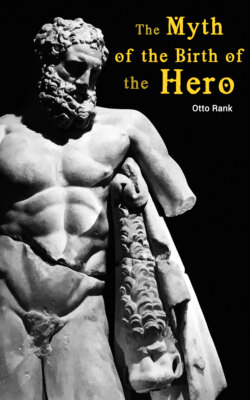Читать книгу The Myth of the Birth of the Hero - Ранк Отто - Страница 5
На сайте Литреса книга снята с продажи.
Moses
ОглавлениеTable of Contents
The biblical birth history of Moses, which is told in Exodus, chapter 2, presents the greatest similarity to the Sargon legend, even an almost literal correspondence of individual traits.28 Already the first chapter (22) relates that Pharaoh commanded his people to throw into the water all sons which were born to Hebrews, while the daughters were permitted to live; the reason for this order being referred to the overfertility of the Israelites. The second chapter continues as follows:
“And there went a man of the house of Levi, and took to wife a daughter of Levi29. And the woman conceived, and bare a son: and when she saw him that he was a goodly child, she hid him three months. And when she could no longer hide him, she took for him an ark of bulrushes, and daubed it with slime and with pitch, and put the child therein; and she laid it in the flags by the river’s brink. And his sister stood afar off to wit what would be done to him. And the daughter of Pharaoh came down to wash herself at the river; and her maidens walked along by the river’s side and when she saw the ark among the flags, she sent her maid to fetch it. And when she opened it, she saw the child, and behold the babe wept. And she had compassion on him, and said, this is one of the Hebrews’ children. Then said his sister to Pharaoh’s daughter, Shall I go and call to thee a nurse of the Hebrew women, that she may nurse the child for thee? And Pharaoh’s daughter said to her, Go. And the maid went and called the child’s mother. And Pharaoh’s daughter said unto her, Take this child away, and nurse it for me, and I will give thee wages. And the woman took the child, and nursed it. And the child grew, and she brought him unto Pharaoh’s daughter, and he became her son. And she called his name Moses:30 and she said, Because I drew him out of the water.”
This account is ornamented by Rabbi mythology through an account of the events preceding Moses’ birth. In the sixtieth year after Joseph’s death, the reigning Pharaoh saw in his dream an old man, who held a pair of scales, all the inhabitants of Egypt lay on one side, with only a sucking lamb on the other, but nevertheless this outweighed all the Egyptians. The startled king at once consulted the wise men and astrologers, who declared the dream to mean that a son would be born to the Israelites, who would destroy all Egypt. The king was frightened, and at once ordered the death of all newborn children of the Israelites in the entire country. On account of this tyrannical order, the Levite Amram, who lived in Goshen, meant to separate from his wife Jocabed, so as not to foredoom to certain death the children conceived from him. But this resolution was opposed later on by his daughter Miriam, who foretold with prophetic assurance that precisely the child suggested in the king’s dream would come forth from her mother’s womb, and would become the liberator of his people.31
Amram therefore rejoined his wife, from whom he had been separated for three years. At the end of three months, she conceived, and later on bore a boy at whose birth the entire house was illuminated by an extraordinary luminous radiance, suggesting the truth of the prophecy. (After Bergel, “Mythology of the Hebrews,” Leipzig, 1882.)
Similar accounts are given of the birth of the ancestor of the Hebrew nation, Abraham. He was a son of Therach—Nimrod’s captain—and Amtelai. Prior to his birth, it was revealed to King Nimrod, from the stars, that the coming child would overthrow the thrones of powerful princes, and take possession of their lands. King Nimrod means to have the child killed immediately after its birth. But when the boy is requested from Therach, he says: Truly a son was born to me, but he has died. He then delivers a strange child, concealing his own son in a cave underneath the ground, where God permits him to suck milk from a finger of the right hand. In this cave, Abraham is said to have remained until the third (according to others the tenth) year of his life. (Compare Beer, “The Life of Abraham,” according to the interpretation of Jewish traditions, Leipzig, 1859, and Aug. Wünsche, “From Israel’s Temples of Learning,” Leipzig, 1907.) Also in the next generation, in the story of Isaac, appear the same mythical motives. Prior to his birth King Abimelech is warned by a dream not to touch Sarah, as this would cause woe to betide him. After a long period of barrenness, she finally bears her son, who (in later life, in this report) after having been destined to be sacrificed by his own father (foster-father) Abraham, is ultimately rescued by God. But Abraham casts out his own son Ishmael, with Hagar, the boy’s mother (Genesis 20, 6. See also Bergel, loc. cit.).
